译林牛津版高中英语必修一 Unit 2 Growing painis Grammar and usage(35张ppt )
文档属性
| 名称 | 译林牛津版高中英语必修一 Unit 2 Growing painis Grammar and usage(35张ppt ) |
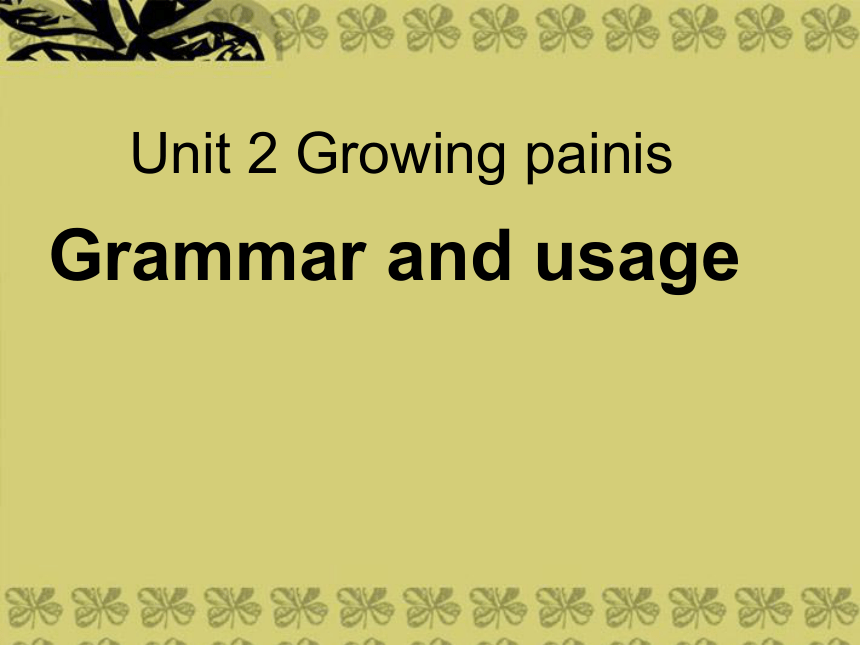
|
|
| 格式 | zip | ||
| 文件大小 | 850.5KB | ||
| 资源类型 | 教案 | ||
| 版本资源 | 牛津译林版 | ||
| 科目 | 英语 | ||
| 更新时间 | 2019-08-03 00:00:00 | ||
图片预览

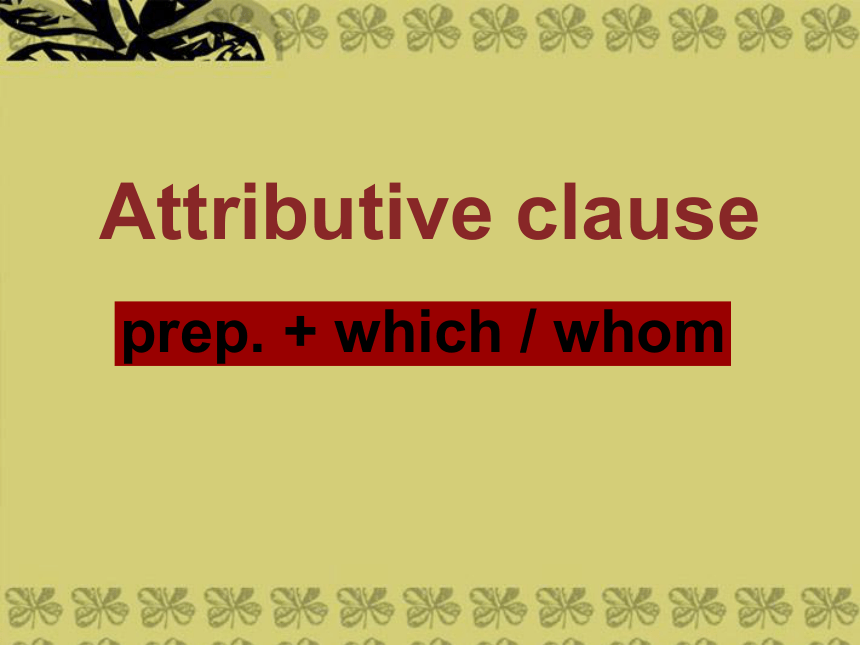
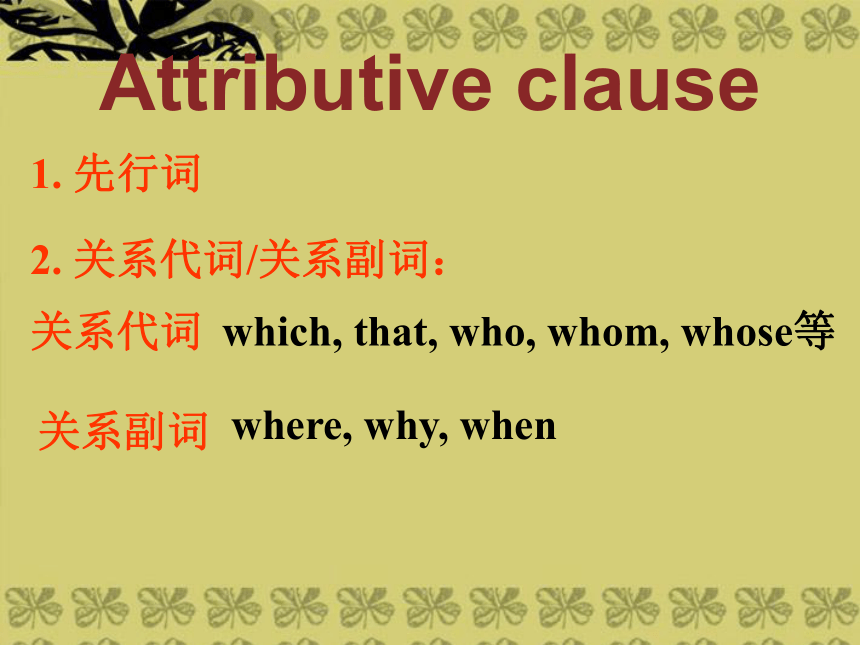
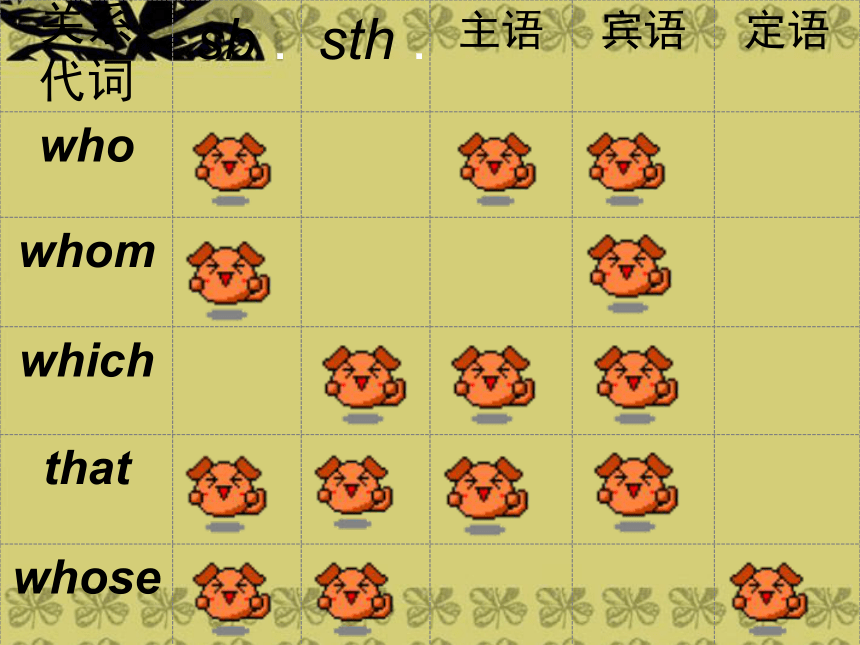
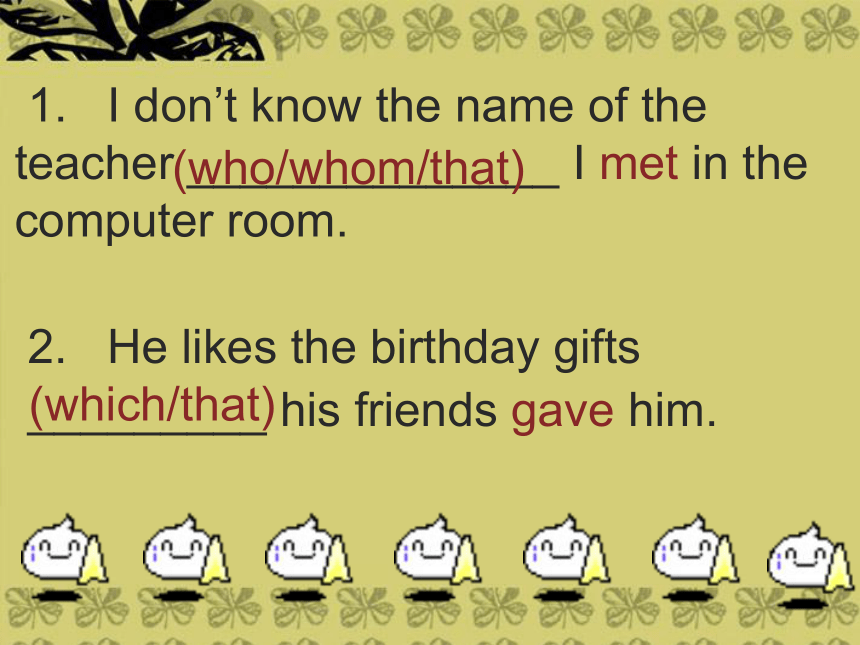

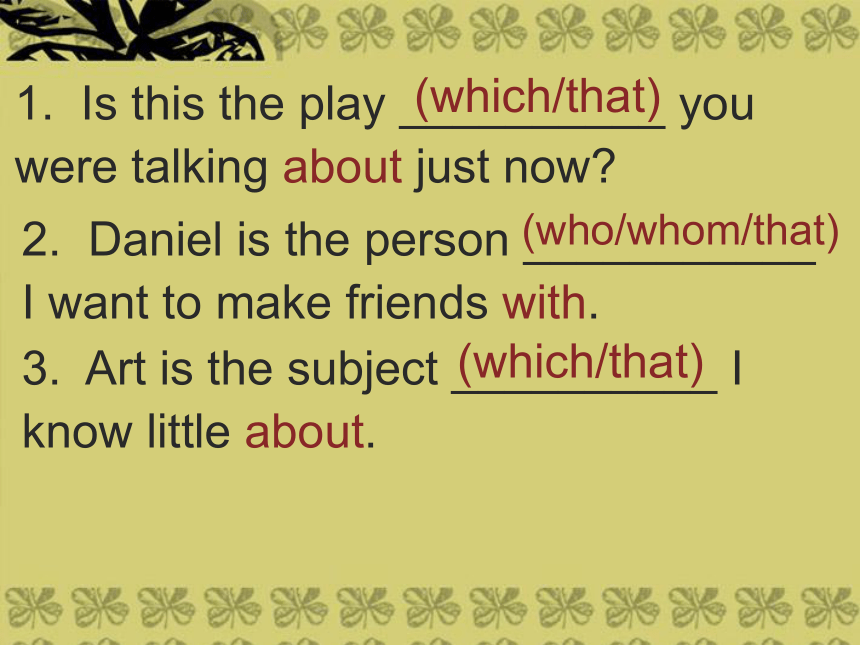
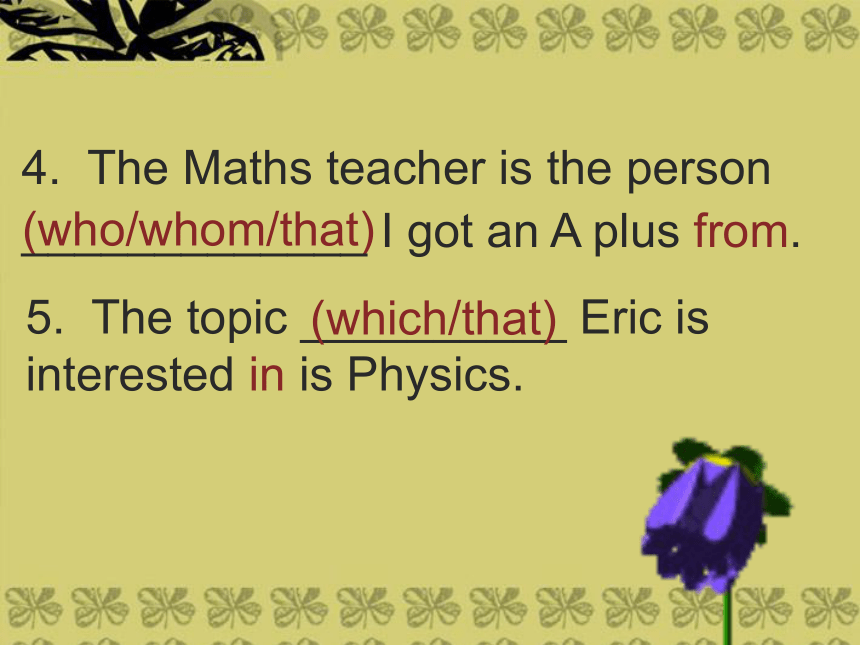
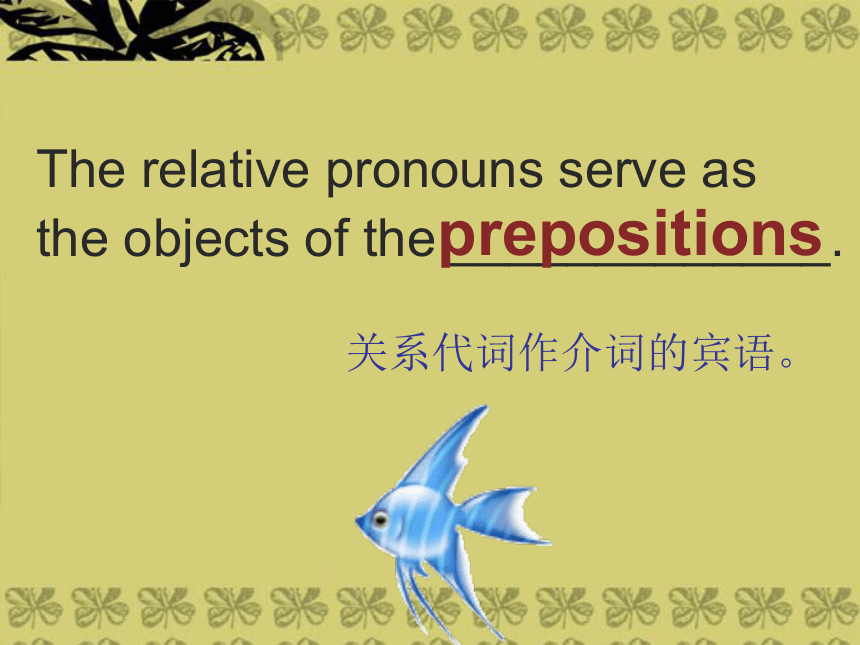
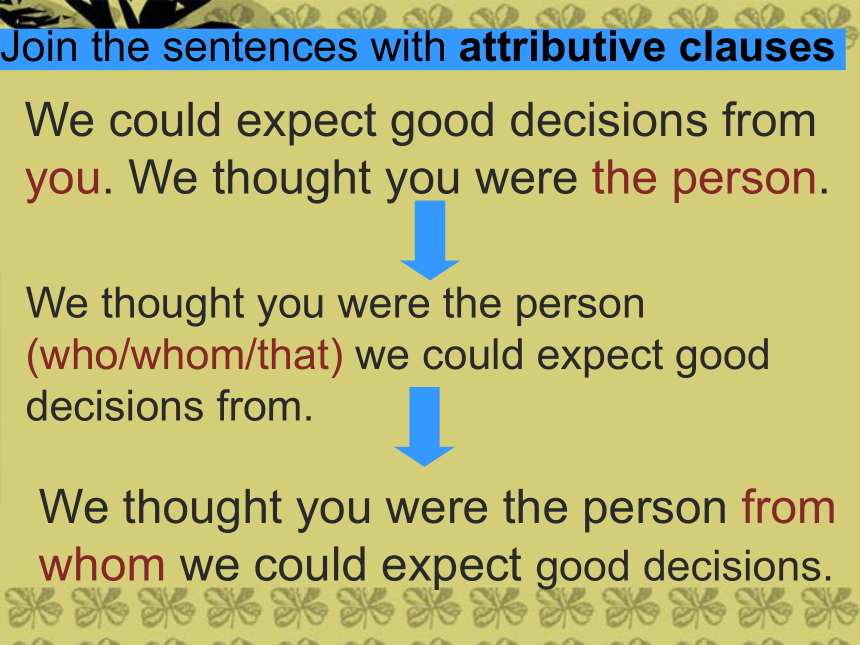
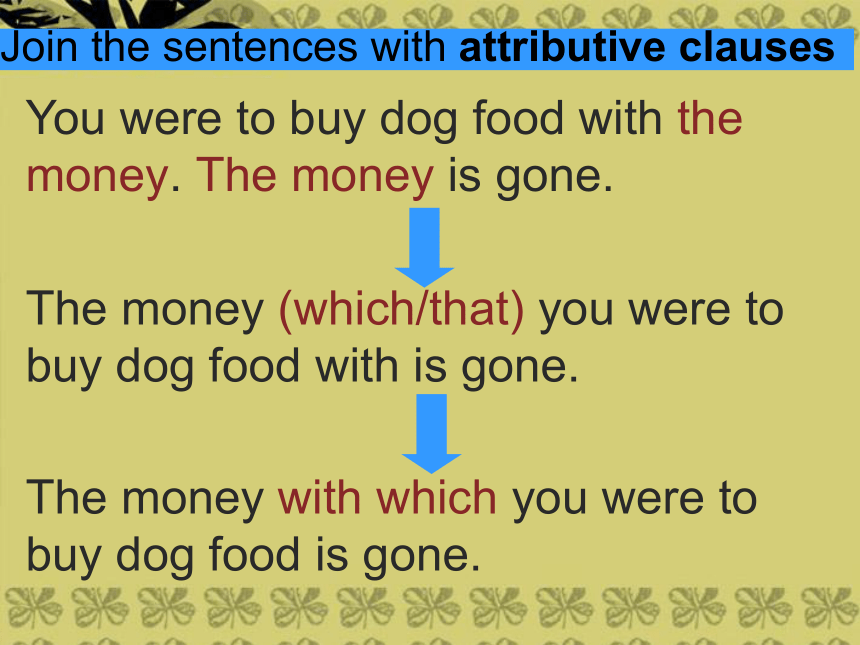
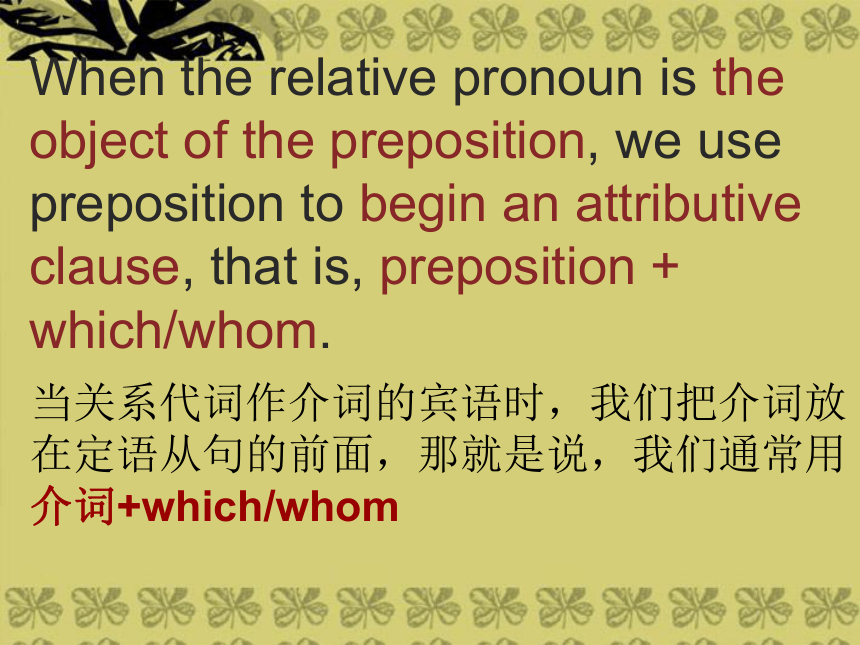
文档简介
(共35张PPT)
Grammar and usage
Unit 2 Growing painis
Attributive clause
prep. + which / whom
Attributive clause
1. 先行词
2. 关系代词/关系副词:
关系代词
which, that, who, whom, whose等
关系副词
where, why, when
关系
代词 sb . sth . 主语 宾语 定语
who
whom
which
that
whose
1. I don’t know the name of the
teacher ______________ I met in the
computer room.
(who/whom/that)
2. He likes the birthday gifts
_________ his friends gave him.
(which/that)
The relative pronouns serve as the
objects of the _________.
verbs
关系代词作动词的宾语。
1. Is this the play __________ you
were talking about just now?
2. Daniel is the person ___________
I want to make friends with.
3. Art is the subject __________ I
know little about.
(which/that)
(who/whom/that)
(which/that)
(who/whom/that)
4. The Maths teacher is the person
_____________ I got an A plus from.
5. The topic __________ Eric is
interested in is Physics.
(which/that)
The relative pronouns serve as
the objects of the _____________.
prepositions
关系代词作介词的宾语。
Join the sentences with attributive clauses
We could expect good decisions from
you. We thought you were the person.
We thought you were the person
(who/whom/that) we could expect good
decisions from.
We thought you were the person from
whom we could expect good decisions.
You were to buy dog food with the
money. The money is gone.
The money (which/that) you were to
buy dog food with is gone.
The money with which you were to
buy dog food is gone.
Join the sentences with attributive clauses
When the relative pronoun is the
object of the preposition, we use
preposition to begin an attributive
clause, that is, preposition +
which/whom.
当关系代词作介词的宾语时,我们把介词放在定语从句的前面,那就是说,我们通常用介词+which/whom
In this case, the relative pronoun,
which or whom, cannot be
replaced with “that” or “who”.
这种情况下,关系代词which/whom不能被that/who替换。同时,关系代词也不能被省略。
Besides, the relative pronoun
cannot be left out.
Rewrite the following sentences
1. Is this the play __________ you
were talking about just now?
2. Daniel is the person ___________
I want to make friends with.
3. Art is the subject __________ I
know little about.
4. The Maths teacher is the person
_____________ I got an A plus from.
5. The topic __________ Eric is
interested in is Physics.
(which/that)
(who/whom/that)
(which/that)
(who/whom/that)
(which/that)
1. Is this the play about which you
were talking just now?
Keys to the sentences
2. Daniel is the person with whom I
want to make friends.
3. Art is the subject about which I
know little.
4. The Maths teacher is the person
from whom I got an A plus.
5. The topic in which Eric is
interested is Physics.
Fill in the blanks with
prep.+ which/whom
1. Are you interested in any songs
____ ______ you’ve listened.
2. Tomorrow is a particular day ____
______ his daughter will get married.
3. This is the knife _____ ______ I
usually cut bread.
to
which
on
which
with
which
4. We can’t live without the sun ____
______ we get heat and light.
5. The subject ___ ______ Eric is
interested is physics.
6. Do you know the girl ____ ______
our head teacher is shaking hands?
7. I can’t find my dictionary ____
______ I paid over $100 .
from
which
in
which
with
whom
for
which
8. This is the good car ____ _____ I
spent all my money.
9. She is the teacher ______ _______
all his students show respect .
10. The teacher ___ ______you have
been waiting is coming in a minute.
on
which
to / for
whom
for
whom
1.你有没有看见那座红房子。
屋子前有一棵大树。
Do you see the red house?
There is a big tree in front of the house.
Do you see the red house in front of
which there is a big tree.
Combine the two sentences to one.
2. 你有没有参观过那座大厦?
在大厦顶上你可以俯瞰整座城市。
Have you ever visited the tall building?
You can have a good view over the
whole city on the top of the building.
Have you ever visited the tall building
on the top of which you can have a
good view of the whole city.
Conclusion
Prepositional phrases
can also be put before relative
pronouns to begin an attributive clause.
介词短语也能放在关系代词的前面。
3. 你有没有看到那座房子?它的屋顶
是红的。
Do you see the house? Its roof is red.
Do you see the house whose roof is
red?
Do you see the house the roof of
which is red?
Do you see the house of which the
roof is red?
4. 我没有参加那次会议,当时我没有
认识到那个会议的重要性。
I didn’t attend the meeting. I didn’t
realize its importance at that time.
I didn’t attend the meeting whose
importance I didn’t realize at that time.
I didn’t attend the meeting the
importance of which I didn’t realize at
that time.
Conclusion
Relative pronoun
can be replaced with
but you must pay attention to its form.
whose
of which
关系代词whose可以用of which 来替换,替换时要注意使用哪种形式
5. 你用那种方式来对待你的父亲,我
不喜欢那种方式。
You treat your father in the way.
I don’t like that way.
I don’t like the way in which you treat
your father.
I don’t like the way (that) you treat
your father.
Conclusion
We use in which or that to begin
an attributive clause after way.
In this case, in which or that
can also be left out.
我们用in which 或者是that来引导way后面的定语从句。
这种情况下的in which 或者是that可以省略。
1. I often dream of having a house.
The house’s roof is red.
2. Harry Potter is the very book!
I am looking for the book!
Rewrite the two sentences into one.
3. S.H.E is the most popular band.
The band attracts many teenagers.
4. This is my second cell phone.
It can be used as a walkman.
5. I received something useless.
I didn’t know who sent it to
me.
6. A girl and her dog were
reported on TV last night.
They helped to catch a thief.
Rewrite the attributive clause into two simple sentences:
The money with which you were to buy dog food is gone.
The money is gone.
You were to buy dog food with the money.
.
Mr. Zhou is a good teacher.
I learned a lot from him.
I left my wallet in the taxi.
I came here in the taxi.
Mr. Zhou is a good teacher from whom I learned a lot.
I left my wallet in the taxi in which I came here.
Basketball is my favorite sport.
I spend much time on the sport.
My pencil is broken.
I often write homework with the pencil.
Basketball is my favorite sport on which I spent much time.
My pencil with which I often write homework is broken.
This is our library.
We can find many English books in the library.
This is our library in which we can find many English books.
This is our library where we can find many English books.
I failed the exam for this reason. Carelessness was the reason.
Carelessness was the reason for which I failed the exam.
Carelessness was the reason why I failed the exam.
Exercises :Finish part A and part B on page 29.
Grammar and usage
Unit 2 Growing painis
Attributive clause
prep. + which / whom
Attributive clause
1. 先行词
2. 关系代词/关系副词:
关系代词
which, that, who, whom, whose等
关系副词
where, why, when
关系
代词 sb . sth . 主语 宾语 定语
who
whom
which
that
whose
1. I don’t know the name of the
teacher ______________ I met in the
computer room.
(who/whom/that)
2. He likes the birthday gifts
_________ his friends gave him.
(which/that)
The relative pronouns serve as the
objects of the _________.
verbs
关系代词作动词的宾语。
1. Is this the play __________ you
were talking about just now?
2. Daniel is the person ___________
I want to make friends with.
3. Art is the subject __________ I
know little about.
(which/that)
(who/whom/that)
(which/that)
(who/whom/that)
4. The Maths teacher is the person
_____________ I got an A plus from.
5. The topic __________ Eric is
interested in is Physics.
(which/that)
The relative pronouns serve as
the objects of the _____________.
prepositions
关系代词作介词的宾语。
Join the sentences with attributive clauses
We could expect good decisions from
you. We thought you were the person.
We thought you were the person
(who/whom/that) we could expect good
decisions from.
We thought you were the person from
whom we could expect good decisions.
You were to buy dog food with the
money. The money is gone.
The money (which/that) you were to
buy dog food with is gone.
The money with which you were to
buy dog food is gone.
Join the sentences with attributive clauses
When the relative pronoun is the
object of the preposition, we use
preposition to begin an attributive
clause, that is, preposition +
which/whom.
当关系代词作介词的宾语时,我们把介词放在定语从句的前面,那就是说,我们通常用介词+which/whom
In this case, the relative pronoun,
which or whom, cannot be
replaced with “that” or “who”.
这种情况下,关系代词which/whom不能被that/who替换。同时,关系代词也不能被省略。
Besides, the relative pronoun
cannot be left out.
Rewrite the following sentences
1. Is this the play __________ you
were talking about just now?
2. Daniel is the person ___________
I want to make friends with.
3. Art is the subject __________ I
know little about.
4. The Maths teacher is the person
_____________ I got an A plus from.
5. The topic __________ Eric is
interested in is Physics.
(which/that)
(who/whom/that)
(which/that)
(who/whom/that)
(which/that)
1. Is this the play about which you
were talking just now?
Keys to the sentences
2. Daniel is the person with whom I
want to make friends.
3. Art is the subject about which I
know little.
4. The Maths teacher is the person
from whom I got an A plus.
5. The topic in which Eric is
interested is Physics.
Fill in the blanks with
prep.+ which/whom
1. Are you interested in any songs
____ ______ you’ve listened.
2. Tomorrow is a particular day ____
______ his daughter will get married.
3. This is the knife _____ ______ I
usually cut bread.
to
which
on
which
with
which
4. We can’t live without the sun ____
______ we get heat and light.
5. The subject ___ ______ Eric is
interested is physics.
6. Do you know the girl ____ ______
our head teacher is shaking hands?
7. I can’t find my dictionary ____
______ I paid over $100 .
from
which
in
which
with
whom
for
which
8. This is the good car ____ _____ I
spent all my money.
9. She is the teacher ______ _______
all his students show respect .
10. The teacher ___ ______you have
been waiting is coming in a minute.
on
which
to / for
whom
for
whom
1.你有没有看见那座红房子。
屋子前有一棵大树。
Do you see the red house?
There is a big tree in front of the house.
Do you see the red house in front of
which there is a big tree.
Combine the two sentences to one.
2. 你有没有参观过那座大厦?
在大厦顶上你可以俯瞰整座城市。
Have you ever visited the tall building?
You can have a good view over the
whole city on the top of the building.
Have you ever visited the tall building
on the top of which you can have a
good view of the whole city.
Conclusion
Prepositional phrases
can also be put before relative
pronouns to begin an attributive clause.
介词短语也能放在关系代词的前面。
3. 你有没有看到那座房子?它的屋顶
是红的。
Do you see the house? Its roof is red.
Do you see the house whose roof is
red?
Do you see the house the roof of
which is red?
Do you see the house of which the
roof is red?
4. 我没有参加那次会议,当时我没有
认识到那个会议的重要性。
I didn’t attend the meeting. I didn’t
realize its importance at that time.
I didn’t attend the meeting whose
importance I didn’t realize at that time.
I didn’t attend the meeting the
importance of which I didn’t realize at
that time.
Conclusion
Relative pronoun
can be replaced with
but you must pay attention to its form.
whose
of which
关系代词whose可以用of which 来替换,替换时要注意使用哪种形式
5. 你用那种方式来对待你的父亲,我
不喜欢那种方式。
You treat your father in the way.
I don’t like that way.
I don’t like the way in which you treat
your father.
I don’t like the way (that) you treat
your father.
Conclusion
We use in which or that to begin
an attributive clause after way.
In this case, in which or that
can also be left out.
我们用in which 或者是that来引导way后面的定语从句。
这种情况下的in which 或者是that可以省略。
1. I often dream of having a house.
The house’s roof is red.
2. Harry Potter is the very book!
I am looking for the book!
Rewrite the two sentences into one.
3. S.H.E is the most popular band.
The band attracts many teenagers.
4. This is my second cell phone.
It can be used as a walkman.
5. I received something useless.
I didn’t know who sent it to
me.
6. A girl and her dog were
reported on TV last night.
They helped to catch a thief.
Rewrite the attributive clause into two simple sentences:
The money with which you were to buy dog food is gone.
The money is gone.
You were to buy dog food with the money.
.
Mr. Zhou is a good teacher.
I learned a lot from him.
I left my wallet in the taxi.
I came here in the taxi.
Mr. Zhou is a good teacher from whom I learned a lot.
I left my wallet in the taxi in which I came here.
Basketball is my favorite sport.
I spend much time on the sport.
My pencil is broken.
I often write homework with the pencil.
Basketball is my favorite sport on which I spent much time.
My pencil with which I often write homework is broken.
This is our library.
We can find many English books in the library.
This is our library in which we can find many English books.
This is our library where we can find many English books.
I failed the exam for this reason. Carelessness was the reason.
Carelessness was the reason for which I failed the exam.
Carelessness was the reason why I failed the exam.
Exercises :Finish part A and part B on page 29.
